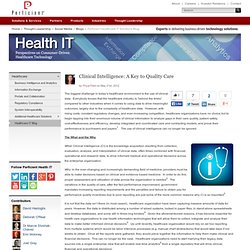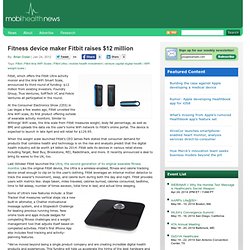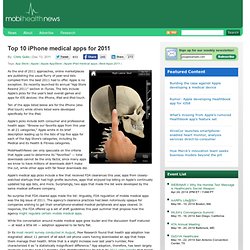

Clinical Intelligence: A Key to Quality Care. The biggest challenge in today’s healthcare environment is the use of clinical data.

Everybody knows that the healthcare industry is “behind the times” compared to other industries when it comes to using data to drive meaningful outcomes, largely due to the complexity of healthcare data. However, with rising costs, constant regulatory changes, and ever-increasing competition, healthcare organizations have no choice but to begin tapping into their enormous volume of clinical information to analyze gaps in their care quality, patient safety, cost-effectiveness and efficiency; develop integrated and coordinated care and contracting models; and prove their performance to purchasers and payers1. The use of clinical intelligence can no longer be ignored. The What and the Why Why: In the ever-changing and increasingly demanding field of medicine, providers must be able to make decisions based on clinical and evidence based medicine.
Protecting your brain: ‘use it or lose it’ Effects on neurons of an active cognitive lifestyle in Brodmann area 9 (mid-prefrontal lobe, involved in memory). A high cognitive lifestyle score was associated with increased neuronal density (A, B) and greater neocortical thickness (C, D). (Credit: M. J. Valenzuela et al. /Biol Psychiatry) Cultivation of an active cognitive lifestyle through lifespan engagement in a rich array of mentally stimulating activities may help reduce dementia risk, according to a major study of more than 13,000 individuals aged over 65 years and followed for 14 years.
An active cognitive lifestyle score (CLS) in men was associated with less cerebrovascular disease, and in women was associated with greater brain weight. “Overall, our research suggests that multiple complex brain changes may be responsible for the ‘use it or lose it’ effect,” said Associate Professor Michael J. Study methodology and results At the time of this study, 329 brains had been donated and were available for analysis. Ref.: Michael J. BioDigital Human. Home - The Health 2.0 Developer Challenge.
Fitness device maker Fitbit raises $12 million. Fitbit, which offers the Fitbit Ultra activity monior and the Aria WiFi Smart Scale, announced its third round of funding: $12 million from existing investors.

Foundry Group, True Ventures, SoftTech VC and Felicis Ventures all participated in the round. At the Consumer Electronics Show (CES) in Las Vegas a few weeks ago, Fitbit unveiled the Aria WiFi scale, its first product offering outside of wearable activity monitors. Similar to Withings’ WiFi scale, the Aria scale from Fitbit measures weight, body fat percentage, as well as BMI and uploads the data via the user’s home WiFi network to Fitbit’s online portal.
The device is expected to launch in late April and will retail for $129.95. When the weight scale launched Fitbit’s CEO James Park stated that consumer demand for products that combine health and technology is on the rise and analysts predict that the digital health industry will be worth $4 billion by 2014. More in the press release below: HealthInterlink.com. Top 10 iPhone medical apps for 2011. As the end of 2011 approaches, online marketplaces are publishing the usual flurry of year-end lists compiled from the best 2011 had to offer.

Apple is no exception. Its recently launched its annual “App Store Rewind 2011″ section in iTunes. The lists include Apple’s picks for the year’s best overall games and apps for iOS devices: the iPhone, iPad and iPod touch. Ten of the apps listed below are for the iPhone (also iPod touch) while others listed were developed specifically for the iPad. Apple’s picks include both consumer and professional health apps: “Browse our favorite apps from this year in all 21 categories,” Apple wrote in its brief description leading up to the lists of top five apps for each of the App Store’s categories, including its Medical and its Health & Fitness categories.
No surprise that FDA cleared apps made the list: Arguably, FDA regulation of mobile medical apps was the big issue of 2011. Medicine Moving to Wireless Technology for Quality and Savings. Feds Propose One-Year ICD-10 Delay - Healthcare - Policy & Regulation. Department of Human and Health Services proposes extending ICD-10 compliance deadline to Oct. 1, 2014. It also proposes unique ID numbers for health plans to save provider frustration and money.
Top 9 Health IT Stories Of 2011 (click image for larger view and for slideshow) The U.S. Department of Health and Human Services (HHS) Monday announced a proposed rule to postpone the compliance date for ICD-10 by one year to Oct. 1, 2014. The compliance deadline for ICD-10 had been set for Oct. 1, 2013. Meanwhile, in addition to extending the ICD-10 deadline, HHS Monday also proposed establishing a unique health plan identifier (HPID) under the Health Insurance Portability and Accountability Act of 1996 (HIPAA). [ Is it time to re-engineer your clinical decision support system? Currently, when health plans and entities such as third-party administrators bill providers, the billing party is identified using a wide range of different identifiers that do not have a standard length or format.